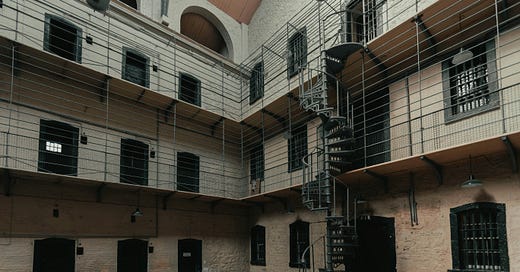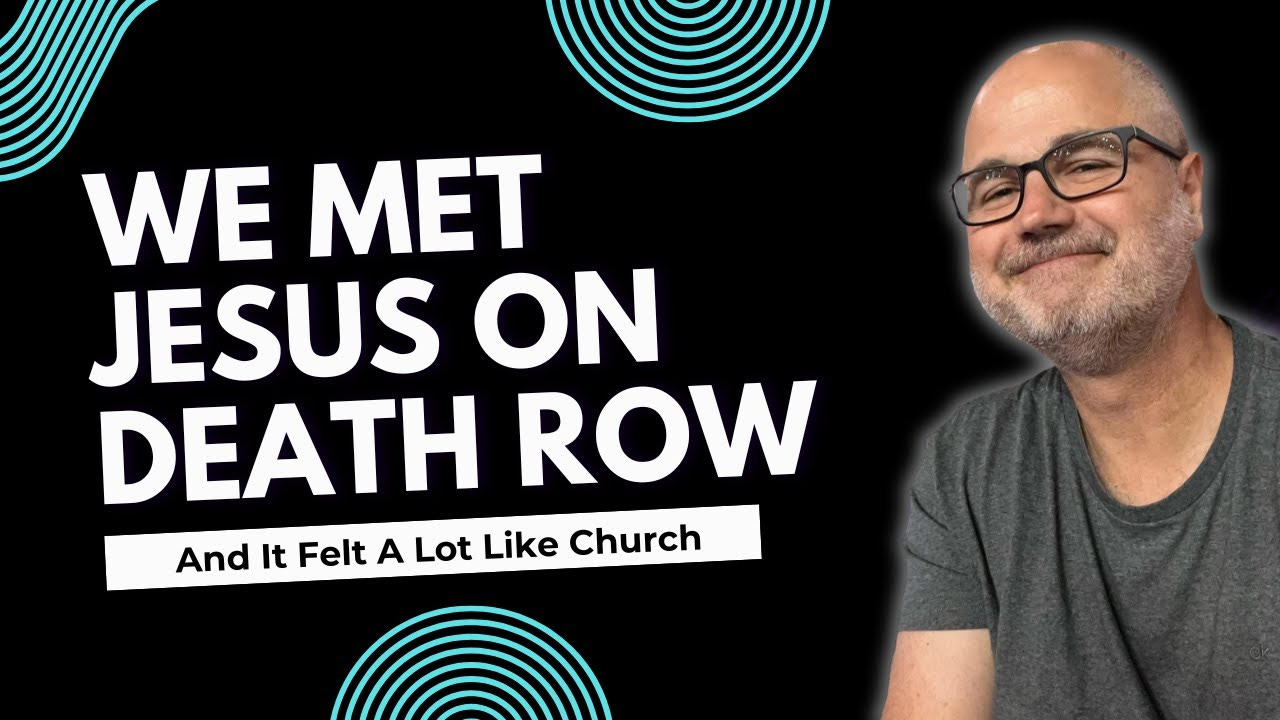More Freedom Behind Prison Walls? Encountering Jesus on Death Row
What Men on Death Row Taught Me About Freedom, Faith, and Joy
It was raining the day a few friends and I from the Sycamore Community visited death row. We had been invited by a fellow Sycamore member who also serves as the chair of the board for Men of Valor, a Nashville-based prison and mentoring initiative. The walk from the parking lot to the prison was wet, gray, and heavy—but strangely, the rain brought to mind a story that lifted my spirit as I approached the prison doors.
Several years ago, I had the opportunity to meet and hear the powerful, heartbreaking story of Anthony “Ray” Hinton. Ray spent nearly 30 years on Alabama’s death row for a crime he didn’t commit. During our time together, he told me about the day he was finally released. What moved him most, he said, was the simple experience of feeling rain fall on his face again. Rain—something many of us treat as an annoyance—had become for him a sacred sign of freedom. A baptism of sorts, if it were possible, directly from God.
I’ve never enjoyed walking in the rain, but I couldn’t stop thinking about Ray’s perspective as we made our way toward that prison. What came next was a three-hour conversation that would change the way I understand freedom. It became clear that something astonishing is happening behind those walls. I saw with my own eyes that in some ways, there is more heart-level freedom among the Christian men on death row than many of us experience on the outside.
COMPANION VIDEO
This video includes original content distinct from the essay.
To view, click here.
Not Monsters—Brothers in Christ
As I sat across from men who have been branded by society as “death row inmates,” I did not encounter the caricatures often presented in media or culture. I did not see monsters. What I encountered were men who carry deep regrets but who are also marked by gentleness, hospitality, and an unmistakable love for Jesus. One of them, with trembling sincerity, said to us: “I hate what I did 19 years ago. I’m also sad that much of society judges my whole life by my worst five minutes.”
That sentence has stayed with me—because how many of us, if judged solely by our worst moments or seasons, could withstand it?
Many of these men have become deeply devoted followers of Jesus while awaiting their death sentence. They are men who have wept over their pasts, who have repented fully, and who now live each day thirsting for and accessing grace. Some were wrongly convicted, while others own their crimes. But all of them have been changed—not by time served, but by the Savior who meets them in their cells and their mutual encouragement to each other.
It is far too easy to define a person by their greatest failure. But Jesus never does. He defines us by His love, His sacrifice, and His resurrection. The same Jesus who stood in front of a woman caught in adultery and refused to condemn her still stands today—this time, inside prison walls.
There is holy ground there. It’s paradoxical, I know, but grace often flourishes in places we least expect.
Kevin Burns, aka “KB:” The Pastor on Death Row
One of the men we met was Kevin Burns—known to his friends as KB. He’s been on death row in Nashville for nearly 30 years, convicted of murders that compelling evidence now strongly suggests he did not commit. KB co-wrote a book titled The Best Day of My Life with his friend and fellow pastor Kevin Riggs. The title is not ironic. For KB, the “best day” wasn’t the day he was released—because that hasn’t happened yet. It was the day he met Jesus behind bars.
As journalist Cal Thomas wrote in Injustice in Nashville, KB’s case is heartbreakingly familiar. A young Black man without the means to hire a strong defense attorney is appointed an inadequate one. KB says he believed he was heading to a recording session with friends. Instead, they drove to a neighborhood where gunfire erupted, killing two people in a parked car. KB says he never touched a weapon, and indeed, no fingerprints of his were found on any. Yet he was charged with felony murder and sentenced to die.
Since then, multiple witnesses have changed their testimonies—some more than once—and others have come forward to say KB didn’t match the description of the shooter. But due to legal constraints in the appeals process, this new evidence has not been allowed into the courtroom. When his case reached the U.S. Supreme Court, a 6–3 decision declined to hear it. One Justice dissented, warning that “a very robust possibility” exists that KB was sentenced to death based on incomplete and flawed information.
So here KB remains, in a cell. And yet, if you sit with him, as we did, you find not despair—but joy. A radiant, settled and sturdy joy. Every time the name of Jesus was mentioned or the Bible was referenced in our conversation, KB’s entire face lit up. He smiled big. He nodded enthusiastically. He couldn’t help himself.
KB became a Christian on death row. Since then, he has led Bible studies, mentored fellow inmates, and been ordained as a pastor. Guards and visitors speak of his faith, his consistency, and his kindness. His life isn’t about clinging to religion for comfort. It’s about being genuinely transformed by Christ. His hope no longer rests in the court’s verdict—but in the mercy of God.
Pervis Payne and the Absence of Bitterness
We also spent time with Pervis Payne—a name some may recognize from national headlines. Like KB, Pervis was swept into a system riddled with bias, error, and failure. His case has become emblematic of how broken our justice system can be: racially charged accusations, limited access to proper legal defense, and evidence later proven not only to be unreliable, but false.
Pervis spent 37 years on death row for a crime he has always maintained he did not commit. And just recently, conclusive forensic evidence has come to light—evidence that vindicates him. He is no longer under a death sentence. But still, strangely, and for reasons that are difficult to understand, he is still awaiting release.
When I met Pervis, what struck me most was not just the injustice of his situation. It was his heart. I detected zero bitterness in him. No anger. No entitlement. Instead, he radiated gratitude—gratitude that somehow, even through the devastation of losing 37 years of his life, he had gained something infinitely greater while sitting on death row: Christ.
How does that happen? How does anyone endure that kind of injustice and come out radiant with grace? It happens when Jesus becomes not just a part of your life, but the whole of it. When your identity is no longer shaped by your suffering, but by your Savior.
Though Pervis has not yet walked free, there is no mistaking that his soul has already been free for years.
Jesus on Death Row
As my friends and I left the prison that evening, I turned to one of them and asked, “Did you get the feeling, while we were in there, that there might actually be more freedom inside those prison walls than out here in the free world?”
Based on the demeanor of nearly every inmate we met, we both nodded like KB does when someone mentions the name of Jesus.
Because there was more freedom. A deeper freedom. The kind that doesn’t depend on circumstances, but flows from the eternal hope of Christ Himself.
It would be easy to make these stories only about criminal justice reform—and to be sure, reform is sorely needed. But KB and Pervis and their friends would be the first to say their stories are about something even bigger: the gospel. The good news that Jesus—who was Himself falsely accused, imprisoned, and sentenced to death—now walks freely through prison corridors, sits beside both the guilty and the innocent, and offers them the same words He offers us:
“There is now no condemnation for those who are in Christ Jesus” (Romans 8:1).
If KB and Pervis can know joy inside the walls of injustice, what does that say to those of us who live outside them?
The rain that day reminded me: grace falls freely. Often in the places we least expect. May we have the eyes to see it, and the hearts and, in the spirit of Ray Hinton, the gratefully liberated faces to receive it.






Thank you for visiting Unit 2. Thank you for opening your heart and mind to a different reality and for being willing to share your story. Many of us will be marching for mercy on Sunday May 18, here in Nashville, just prior to the next scheduled execution. As we do each time an execution is scheduled, we march from Riverbend Maximum Security Prison to Capitol Hill with requests from these same men for Gov Lee to come meet them and pray with them. We walk in lament of what is and with prayers for what can be. We'd love to have you join us.
What a beautiful testament to Jesus for all people suffering injustice